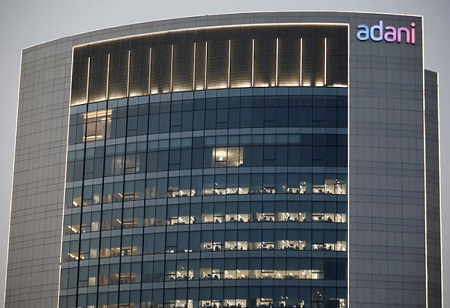
Adani to build 3 giga factories in India as part of $70 bn green investment

 Asia's richest man Gautam Adani said his ports-to-power conglomerate will build three giga factories for manufacturing solar modules, wind turbines, and hydrogen electrolyzers as part of a USD 70 billion investment in clean energy by 2030.
Asia's richest man Gautam Adani said his ports-to-power conglomerate will build three giga factories for manufacturing solar modules, wind turbines, and hydrogen electrolyzers as part of a USD 70 billion investment in clean energy by 2030.
Adani group is stepping up investments across the green energy value chain as it aims to become the world's top renewable energy producer by 2030.
"The Adani Group has already committed USD 70 billion (for climate change and green energy). This will see us building three giga factories in India leading to one of the world's most integrated green-energy value chains," he said after receiving the USIBC Global Leadership Award here.
These giga factories will "extend from polysilicon to solar modules, complete manufacturing of wind turbines, and the manufacturing of hydrogen electrolyzers," he said.
This, he said, will generate an additional 45 GW of renewable energy to add to Adani group's existing 20 GW capacity, as well as 3 million tons of hydrogen by 2030.
The announcement comes weeks after rival billionaire Mukesh Ambani announced a fifth giga factory as part of investment in low carbon energy.
The new giga factory for power electronics will be in addition to four giga factories announced last year for making integrated solar PV modules that will produce electricity from sunlight, electrolyzers that produce hydrogen from water, fuel cells and batteries to store energy from the grid as well as 20 GW solar energy capacity by 2025 for captive needs.
Listing out imperatives for US-India engagement, Adani said the combined value of the GDP of the two nations in 2050 is expected to be a staggering USD 70 trillion dollars or 35-40 per cent of the global economy.
By that year, the combined population of the two countries will be over 2 billion with a median age of less than 40 years as compared to the already median age of 44 in Europe and 40 in China.
"When seen through these lenses of economics and the raw power of consumption it is evident that the existing 150 billion dollars of bilateral trade between the US and India is no more than a speck in the ocean. Far more needs to be done," he said.
On the stuck trade deal, he said he believes the two nations will resolve and mutually accept some compromises.
"What we cannot afford - is to remain stuck in the belief - that all aspects of trade and relations are being hampered as a result of tariffs," he said